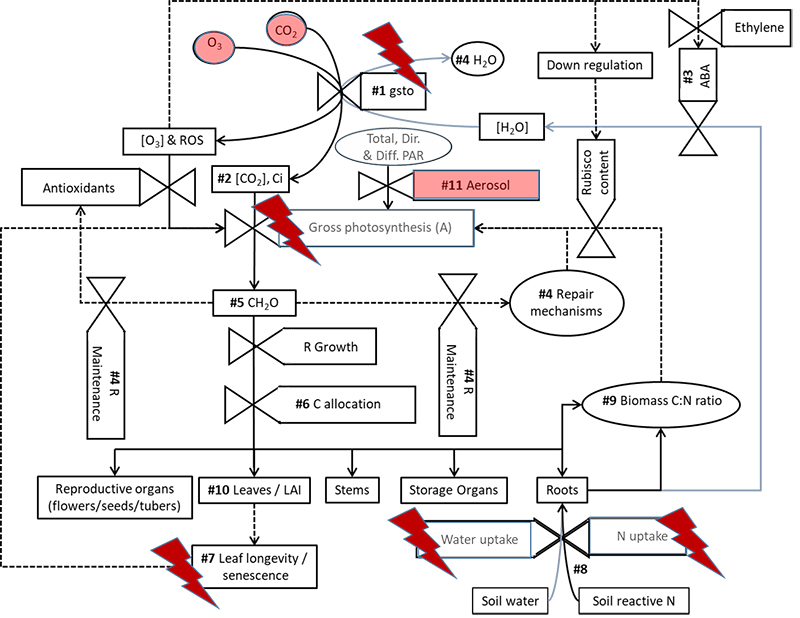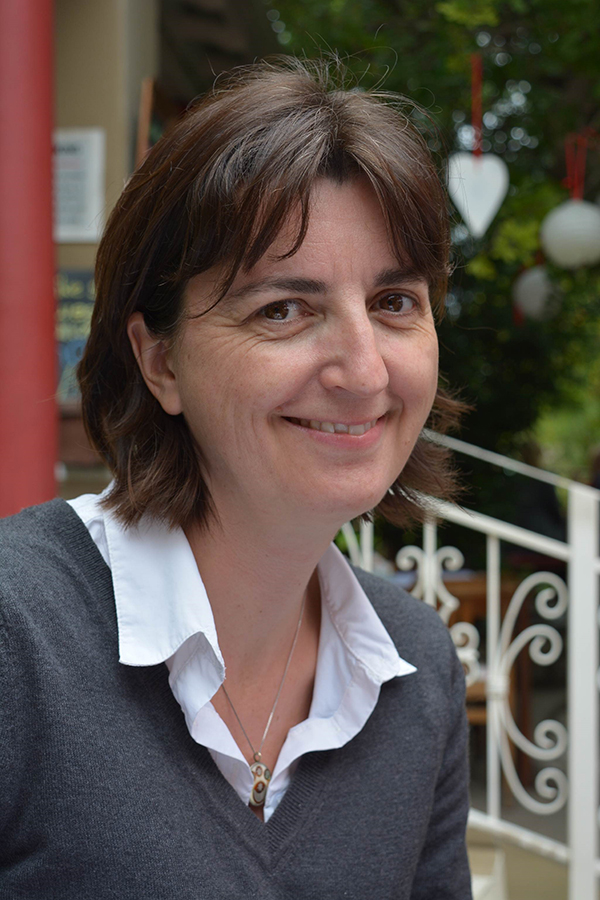Developing resilience and tolerance of crop resource use efficiency to climate change and air pollution
It is well known that climate change will impact arable crop production across Europe in coming decades. We also know that air pollution is already having substantial impacts on crop productivity causing yield losses of between 10 and 15% on average across Europe for sensitive staple crops such as wheat. Preliminary results of SUSCAP experiments, performed in open top chambers in central Spain during 2020, have found that both ozone and drought stress alone and in combination reduce photosynthesis and induce accelerated leaf senescence with potential consequences for nitrogen, water and radiation use efficiencies. SUSCAP has been developing a new generation of process-based crop models to incorporate such ozone-induced changes in photosynthesis and senescence. These models will be calibrated and evaluated with empirical data (including that collected within the SUSCAP experiment in Spain) and remotely sensed data collected and analysed to describe LAI, evapotranspiration and soil moisture across Europe. These models will then be used to assess the impacts of combined stresses on crop development, growth and yield, for both the current day and future 2050 European climates. This will allow us to identify the magnitude, frequency and geographical distribution of stress-induced changes to resource use efficiency and hence crop productivity.

Source: Lisa Emberson
This project focusses on four goals. We have partly achieved our first goal, through experimental work, which has identified the stress combinations (e.g. pollution (aerosol and ozone), drought, high temperatures, low soil fertility) that are most likely to adversely affect crop resource use efficiency and ultimately crop growth, development and yield.
We are modelling climate and pollution data for the whole of Europe, developing and incorporating necessary bias correction methods for agriculture that will allow us to achieve our second goal. This will provide a description of the frequency, magnitude and geographical distribution of the most damaging of these multi-stress combinations and where they are most likely to occur both for the current day as well as the future (2050). Our third goal will be to use this information to identify new plant traits that could be bred for, and new crop management practices that could be employed by farmers, to help adapt to the stresses resulting from air pollution and climate change conditions. We have already identified the adaptation options most readily associated with climate change and how these vary in type and frequency by European region. This will support our final goal, to identify appropriate, realistic and feasible solutions for their remediation. This is being done in close collaboration with a variety of stakeholders both to raise awareness of these issues among farmers and farming groups, as well as to understand how the issues of climate and pollution sit within the broader context of challenges facing farmers. Ultimately, this project will target an increase in the sustainability of agriculture across Europe and a reduction in the threats to crop resource use efficiency from both current and future climate change and air pollution stress.

Source: Lisa Emberson
Prof Lisa Emberson
SEI York Environment, SEI York, UK
Email: l.emberson@york.ac.uk
Dr Jana Sillmann
CICERO, NORWAY
Dr Maurits Van den Berg
JRC, Directorate Sustainable Resources, Unit D.5 (Food Security), ITALY
Prof Frank Ewert
University of Bonn, INRES Crop Science, GERMANY
Prof Marcello Donatelli
CREA, ITALY
Dr Ionica Circiu
AFAHC, ROMANIA
Dr Alexandru Dumitrescu
National Meteorological Administration Climatology, ROMANIA
Dr Victoria Bermejo
CIEMAT, Environmental Department, SPAIN
2022
Feng, Y., Nguyen, T. H., Alam, M. S., Emberson, L., Gaiser, T., Ewert, F., and Frei, M. (2022). Identifying and modelling key physiological traits that confer tolerance or sensitivity to ozone in winter wheat. Environmental pollution, 304, 119251.
Shrestha, A., Fendel, A., Nguyen, T. H., Adebabay, A., Kullik, A. S., Benndorf, J., Leon, J., and Naz, A. A. (2022). Natural diversity uncovers P5CS1 regulation and its role in drought stress tolerance and yield sustainability in barley. Plant, cell & environment, 45 (12), 3523–3536.
2021
Chang-Espino, M., González-Fernández, I., Alonso, R., Araus, J.L., and Bermejo-Bermejo, V. (2021). The effect of increased ozone levels on the stable carbon and nitrogen isotopic signature of wheat cultivars and landraces. Atmosphere (Basel), 12 (7), 883.
Ontel, I., Irimescu, A., Boldeanu, G., Mihailescu, D., Angearu, C.-V., Nertan, A., Craciunescu, V., and Negreanu, S. (2021). Assessment of Soil Moisture Anomaly Sensitivity to Detect Drought Spatio-Temporal Variability in Romania. Sensors, 21 (24), 8371.
Sillmann, J., Aunan, K., Emberson, L., Büker, P., van Oort, B., O’Neill, C., Otero, N., Pandey, D., and Brisebois, A. (2021). Combined impacts of climate and air pollution on human health and agricultural productivity. Environmental Research Letters, 16 (9), 093004.
2020
Angearu, C.-V., Ontel, I., Boldeanu, G., Mihailescu, D., Nertan, A., Craciunescu, V., Catana, S., and Irimescu, A. (2020). Multi-Temporal Analysis and Trends of the Drought Based on MODIS Data in Agricultural Areas, Romania. Remote Sensing, 12 (23), 3940.
Brabec, M., Dumitrescu, A., Paulescu, M., and Badescu, V.(2020). A new perspective on the sunshine duration variability. Theoretical and Applied Climatology, 139 1219–1230.
Dentener, F., Emberson, L., Galmarini, S., Cappelli, G., Irimescu, A., Mihailescu, D., Van Dingenen, R., and van den Berg, M. (2020). Lower air pollution during COVID-19 lock-down: improving models and methods estimating ozone impacts on crops. Philosophical transactions. Series A, Mathematical, physical, and engineering sciences, 378 (2183), 20200188.
Emberson, L. (2020). Effects of ozone on agriculture, forests and grasslands. Philosophical transactions. Series A, Mathematical, physical, and engineering sciences, 378 (2183), 20190327.